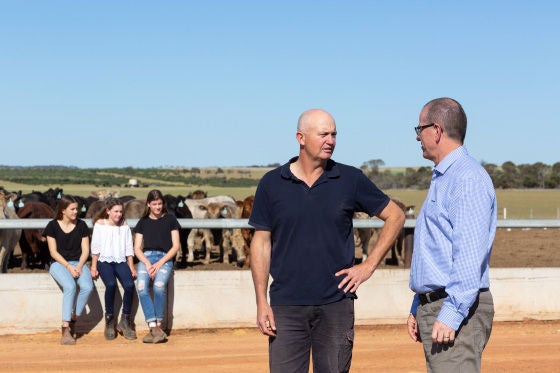Posted by on
12/05/2022
For many grain producers in Western Australia 2017 had a tough start to the grain growing season, with next to no rain appearing until July and frosts that came late in the season.
For brothers Glen and Todd Quartermaine, farming near Dowerin, in WA’s Central Wheatbelt, their crop and pasture had the same uncertain outlook.
Reflecting back towards the end of last year, Glen Quartermaine said 2018 saw an average break to the season and good winter rain, but there was little rain in the spring. However, with no frost and an improved growing season, he expected to take off an average crop.
The game changer
Modern farming methods have been a game changer in moisture management and have been key to the Quartermaines achieving decent yields despite unpredictable weather conditions.
“When Dad and Mum [Tony and Barbara] first started farming here, livestock was still the primary commodity, with cropping playing more of a minor role,” Glen Quartermaine said.
“The cropping that did take place relied heavily on tillage as broadacre spraying was neither widely available or adopted at that stage.
“Since then the region has moved to become much more focussed on intensive farming and now, with improved farming techniques and technology, we are able to get a crop like this despite minimal moisture at planting.”
Glen Quartermaine said improved varieties along with the ability to manage their weeds and moisture profile through spraying rather than ploughing and the improvement in machinery power and technology had given them a good deal more control of their crops.
“While we might not be receiving any more rain than in the 70s, what we do get we now can manage much more effectively and ensure moisture levels last a lot longer,” he said.
“We also have a much better understanding now of how to get the best out of our soil and in recent years soil disruption techniques such as back spading, deep ripping and deep tillage have been employed along with soil amelioration in terms of clay and lime spreading.
“We’re seeing these techniques have a hugely beneficial impact on sandy, highly acidic and non-wetting soils.”
The Quartermaine family now farm around 7,600 hectares of wheat, canola, lupin, barley, and oaten hay with produce either being exported or used in the property’s feedlot.

Feedlot expansion
The feedlot has become a large component of the Quartermaines’ operations in recent years with around 3000 head being fed out annually.
“We started off small with the feedlot in around 1995,” Todd Quartermaine said.
“It was a very basic operation at that point but then we built the main feedlot in 2007.
“Of course, there’s a substantial ongoing spend, since then we have added two hay sheds, a livestock cover and a grain storage facility.”
Majority of the feeding is for their own calves and bought in calves plus a small amount of contract feeding.
“We have around 850 predominately Angus breeders that we sell mainly into processing through Woolworths,” Todd Quartermaine said.
“While the outlay of building the facility has been substantial we’ve been fortunate with the beef prices and that has given us the confidence to continue to expand our operations.”
The Quartermaines have also planted 800 hectares of Tagasaste plants which they say have been pivotal to the management and running of the cows, providing a valuable fodder source for their stock.
Key factors in growth
Diversification and flexibility have been key factors in the growth of the Quartermaines’ business, and they are foundations that Glen Quartermaine said they are keen to maintain as they look at possible future expansion.
“We’ve found that diversifying our operation has certainly helped ensure our capital income.”
“In those years where we suffer from drought or frost we still have a number of avenues where we can create some cash flow and we are also able to value add to the crop we do produce through processing and milling for stock feed.”
It is the search for flexibility and control over their own finances that brought the brothers back to Rabobank after a short time banking elsewhere.
“We moved briefly to one of the big four a few years ago chasing an attractive interest rate at the time,” Glen Quartermaine said.
“However, while the initial interest rate was good, we felt like we lost a lot of control and their product didn’t suit our farming enterprise the way Rabobank’s All In One account did.
“So, we are now back with Rabo, and enjoying the simplicity and flexibility of the account, we feel we’ve got a good deal on the rates and of course we get along well with our Rural Manager.”
Managing succession
With the next generation still in school, Glen and Todd, together with their respective wives Kim and Linda, have only just entered a five-year succession implementation phase, with intention to expand in that time.
With almost 30 years spent working with his brother, Glen Quartermaine said the key to their success had been a shared purpose, communication, and autonomy.
“We’ve always communicated very openly but what also works well for us is that we have a bit more control over different aspects of the operation.”
“While I tend to be a bit more involved in the cropping side of things, Todd is more involved with the cattle, but there is still a lot of crossover.
“I guess the best thing we’ve got going for our business relationship is a healthy amount of debt!
“No matter what, we have to get on and make it happen and continue to build a robust business that can withstand future challenges and hopefully support future generations.”
